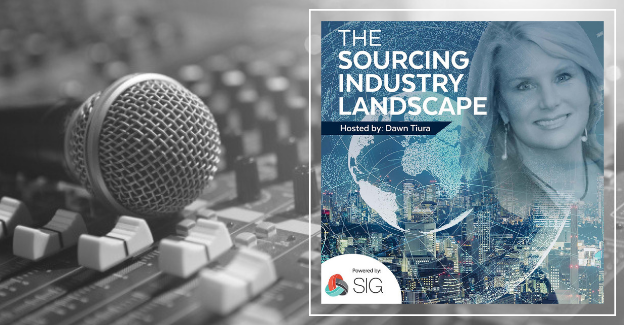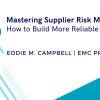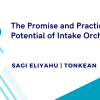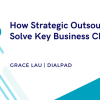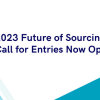In this episode of the Sourcing Industry Landscape, Dawn Tiura interviews Wayne Ezell. Wayne Ezell, CPM, is Vice President of Procure-to-Pay with Fidelity Information Services (FIS). Ezell began his post-secondary education in physics and then moved into sourcing and procurement.
Dawn Tiura: Hello everybody, welcome back. This is Dawn Tiura, and I'm so excited to welcome Wayne Ezell. Wayne Ezell is a Vice President of Procure-to-Pay at Fidelity Information Systems and Wayne and I actually go back a number of years. I've known him for probably the last five to eight years of his journey. But Wayne has a great story to tell, so Wayne, thank you for joining me for Art of Procurement Podcast.
Wayne Ezell: Yeah it's great, Dawn. Thanks for inviting me.
Dawn Tiura: So, Wayne, you... My understanding, and correct me if I'm wrong, but you went to Arizona State University, so of course you'd be in sourcing, but you didn't start off in sourcing. My understanding is you were gonna be a physicist.
Wayne Ezell: Yes. Yeah. So, exactly. I can recall back in high school, that's where my passion for physics really started. I had one of those kind of crazy physics teachers that everything he did just kind of rubbed off, very positively, to students so that's really where I got my passion starting off.
Wayne Ezell: So when I went to Arizona State University, it only made sense for me to actually have my career or my trajectory go into physics. But unfortunately, after a couple years, and then just completing quantum mechanics, and just saying that still gives me kind of a cold sweat by the way, I didn't do so well in that course and I realized then I just lost the fire really, quite frankly, for physics. And I started questioning myself whether that was the major that really was gonna be for me.
Wayne Ezell: But what I can do is I can vividly remember walking the halls in the business school, there was in the State University, and I noticed this very small sign. And it said, 'Purchasing and Logistics'. And you know we've all walked down business schools before and we see accounting and marketing and finance, right, all those traditional ones and I saw this little tiny one and I thought well I'll duck in there and see.
Wayne Ezell: And what a life changer it really turned out to be. And that's really where I met a mentor of mine, that has been my mentor for the last 28 years—his name is [Art Jacobs. He was a professor there, excuse me, at Arizona State, and he really single handedly put the fire or the passion back into my heart for all things procurement and purchasing and supply chain management as it was starting to become.
Wayne Ezell: And so really what he described to me was that supply chain really is a function that needed thought leaders. And really it's from all disciplines and all majors, but really specifically what he focused on were people that could see this big picture. And really this guidance still holds true today, and I can still recall a lot of the sessions I've been at with you and the other leaders that are at SIG that really—they talk about that. They talk about the big picture. And that's really what we get in the procurement world, is we get to understand that big picture. So anyway, two years later I finished my degree and I had a Purchasing Logistics major and it's been great.
Dawn Tiura: That's fantastic. And you know, there's nothing wrong with having that hard science background, that physicist background, and physics background, because it's so good to be able to apply the analytics. But somehow through your journey you picked up the people side as well. So from being in physics and wanting to be a physicist, to being such an amazing sourcing leader, where'd you pick up your people skills?
Wayne Ezell: Well you know I think I probably should give credit to my mom and dad. They probably put a lot of seeds into my history for that happening. But really, we all have an innate slant to what our behaviors are and what I found is that really we become somewhat of a byproduct of our work environment and our school environment.
Wayne Ezell: But I can still recall the different jobs I've had where I've had to play different roles. And so sometimes it really puts us in, maybe, uncomfortable positions at times. Where sometimes you're asked to be called an analyst and guess what, you're like well, “I'm not really an analyst and I don't really know Excel that well.” And we put ourselves in these kind of uncomfortable situations. And so, what I've done over my career, for the most part, is I've thought about the areas where my blind spots are, maybe where I'm not so strong. And this might be a little tangent on your question here, but for example, I also have a Master's Degree in Finance. I never would have done that had I not seen the link between analytics, finance, budgeting international, in procurement. So we get all those things in procurement, and I said well look, that's a blind spot for me. I really should address that blind spot. And that's really what I did by getting that Master's Degree in Finance. It wasn't something that I said that was my desire, but it fits so nicely into all the things I even do today. And as you know so well, procurement organizations a lot of times do fall under finance, so it helps that I can kind of talk the talk as well.
Dawn Tiura: It sure does. But you started off in semiconductors, is that correct?
Wayne Ezell: I did. I started off in semiconductors and I evolved through health care, through insurance, and through finance.
Dawn Tiura: Wow. Those are very dramatic, different industries. But when you were at one of your early semiconductor companies, you said that you had to spend little bit of time on the road with the sales folks as well. Can you tell me how that experience has parlayed into understanding the supply base a little bit better these days.
Wayne Ezell: Yeah, absolutely. I do know that in my very first job, like a lot of us in our first job, we're focused on the task. We're focused on just what's kind of in front of us. But I had an opportunity that I got to meet a number of suppliers with the very first company I was with, and one of those suppliers actually hired me to be their Purchasing Manager.
Wayne Ezell: And in that role. It was a small company, about a hundred million dollars, and 40 people or so, but it gave me a good appreciation, a real good look at the whole supply chain. And so, yeah it's a smaller supply chain, but it gave me a good understanding of not only just performing, but what an internal sales person was asking. We had seven or eight different sales people and they would come to me and say, “Wayne I need this for this client, can you, can we source it and then we're gonna put it in our solution and then we're gonna sell it to them.”
Wayne Ezell: And a lot of times I would... In my first year I would do that. I would just kind of take their word for it. But then what I learned was going out to the customer site and actually hearing first hand from them what they wanted, what they needed, was very beneficial for me. And so it was great for me to now see all the things that I was doing from a procurement function for the internal sales group, what they were trying to do for the end user. Ultimately for our clients and our customers and the consumer.
Wayne Ezell: And really gave me an appreciation, quite frankly, of the value that we bring in procurement to an organization. And in this case it was small, but I can extrapolate it now into being in a 10 billion dollar organization like we are here at FIS. We are very, very important to the supply chain for an organization and that's really where I saw firsthand that look, I'm making an impact on a customer. I'm making an impact on the client. And I got an understanding then of profitability, margins, time, making sure that we got things to them at the right time as well.
Wayne Ezell: So it gave me that good appreciation. And really solidified that look, I'm in the right—this is right field for me. Whether you call it supply chain or procurement or transportation, logistics, direct or indirect, there's that value that we bring to the organization. And as I've mentioned to others in the past, there's really a couple different ways we manage money in an organization: You either manage it by earning it, or you manage it by spending it. And so us procurement folks, me included, we just happen to be those reverse sales people. We just happen to do it on the buy side.
Dawn Tiura: And that's great. But you also, when you describe the skill set that a modern procurement person needs today, we often say they need sales skills. So do you think that you learned a lot of that and you brought it to your teams in the years since you did support the sales effort?
Wayne Ezell: I would say yes. There was a tipping point there where I could have easily went into sales. And when you're younger, I was in my early 20s at the time, there's more money in sales than there is in operations. And that's okay, and that's great, but I would say that I learned to become a very good listener during that period of time because I had to. And I think that's one of the skills I've learned the most was being able to learn, but listen to what the clients were saying, and then be able to repeat it at the same time. That really was a valuable lesson I learned.
Dawn Tiura: That's great. So what made an impact on you to say I'm gonna stay in sourcing all these years, and through all the evolutions, and such the dramatic change that you've seen in our industry. Why have you stayed?
Wayne Ezell: Well, really, I guess it’s more the value that, again, that we're bringing to an organization. Really, there's a—to me I get a chance to inspire, and at the level I'm at today and just all the progressions I've been through, I get a chance to inspire others. I get a chance to set direction. And I get to do that every day. And so I get a chance to either help people in their careers and help inspire them where we're going as an organization, where we're going for a procurement organization, or I can have a chance to not do that—not earn that trust for them. And that's really what really drives me today. Is that we have mission, we have values, we have culture, and I get to make a very large impact on that, and that's what really continues to drive me.
Dawn Tiura: That's great. So where you are today is this a global team that you manage?
Wayne Ezell: It is. At FIS, I probably should take just a moment here to describe FIS. We're Fidelity National Information Services, and we are a finance and technology services company. We support banking, institutional brokerage, and we have hundreds of products and services, and we support 20,000 customers. One of the examples I like to give is that we produce a lot of credit cards, and credit card statements, and so there's a fair chance that credit cards people use, listening to this today, or any of the credit card statements you get, you're probably getting them from FIS.
Wayne Ezell: So don't hate us for that. We're doing that on behalf of a bank, in large respect, but we're...and we're number one in our industry as well. And we're represented in 130 different countries, and from an international perspective and global perspective we have any and all categories. Whether it's India, APAC, or [inaudible], we support all those regions. And we have about roughly 500 million or so spent outside the United States, so it's rather sizeable. And specifically for my team, what I found is very valuable is that we have embedded procurement individuals and professionals in each one of those locations as well because they're close to the customer, they're close to the client, and they're able to one, understand their needs, but also coach them on what we're doing from a procurement perspective.
Dawn Tiura: So before your latest transformation, you were at USAA, out of San Antonio, and I know Kevin Nash had brought you from American Express to USAA, and you left San Antonio to move to Jacksonville, Florida. Tell me, what inspired that move? Was it to get your own global team? What really was your inspiration to move?
Wayne Ezell: A large part of it was, I think, a change in responsibilities. American Express is a great company. I was with American Express at the time, that's where I had a chance to meet Nash and he was able to—he was my leader at American Express. He hired me there, and he went on to be the CPO at USAA, and then Kevin Nash hired me there as well. But really what it turned out to be was, yeah it was a change in scope, it was a change in responsibilities. The team maybe was a little bit smaller, so it wasn't from that perspective. But what it was is I was able to take a lot of the skills and knowledge that I had with other organizations, and I was able to use that at USAA.
Wayne Ezell: And what was interesting was is that USAA was a private company. That was attractive to me. And so they didn't have to think quarter to quarter. They could go, you know, year to year, and then go even multiple years on a project or program or initiative. And so, there was—and on top of that, the mission statement at USAA could be recited by 98% of the 25,000 employees, by heart. And I'm sure Kevin has probably mentioned some of that to you before, but that was very, very unique. And I'm not saying that at American Express we couldn't do that, or we couldn't do that anywhere else but there was just a unique culture to USAA that just really was a pull to me. And sometimes you just feel it in your heart, and you just know it's the right thing to do.
Dawn Tiura: And then you got recruited, and then you end up on Jacksonville. So, tell me—so now you've got your incredible global team. Tell me what do you think makes a successful procurement sourcing supply chain person?
Wayne Ezell: Well I think first, one of the most important is we just can't stop learning. We have to make sure that we're continuing to evolve. And I know you've preached this many times—and we're listening to you Dawn, quite frankly, we hear you on it. But you know, I'll kind of give you my experience with this as well, is that what's really important, in any job you're in, whether it's procurement or anything else, but we have to show and interest outside of our own.
Wayne Ezell: And so I can recall when I was with the semiconductor organizations early in my career, I took specialized courses in learning what a semiconductor was. How to speak the lingo, how to understand the terms, how to understand trends and those types of things. And that was important, and it went a long way in giving me gravitas with others I spoke to and also with our customers.
Wayne Ezell: And then when I moved into financial services, it was different. I mean, all the things technically (who really cares about a microprocessor and how it's built and what that really means). But in financial services, I started working with mutual fund experts and investment bankers and so I thought well look, I need to, like, change it up here a little bit, so I took a certification on mutual funds and became a Certified Mutual Funds Specialist.
Wayne Ezell: And that didn't mean I was gonna go out and sell mutual funds, or for anybody to take advice from me on mutual funds, but what it did is it helped me understand how that part of the company actually made money. It was one thing to hear it, but it was actually better to see it, you know, from a mutual fund perspective. And then just a couple other examples: we did a lot of outsourcing at some other organizations I've been with and at the time... It's okay to learn on the job, it's okay to learn as you go, but what I found was, I became a Certified Outsourcing Professional to bring rigor and best practice to the outsourcing events that I was working on.
Dawn Tiura: So now you have an insatiable curiosity that you have continued to learn. How do you get your team… Is that what you search for in people? People that love to learn, love to stay up to speed because I mean, that's what we need to do, but how do you impart that on your team and inspire them?
Wayne Ezell: Yeah, each person on my team has an individual performance plan just for themselves, for a professional. And so for example, if someone is working in the space of market data—we buy a lot of market data—we'll look for… Yes, we buy a lot of market data, and so what, for example if someone's working as category manager on market data, they will look for courses or seminars or trade magazines to learn more about market data. And so it's part of their review, and we make it a percentage of their review so they're incentivized and they take time to spend on looking for that specialized training to help support them in their categories.
Dawn Tiura: That's great, because so many times we meet sourcing people that don't know what they're sourcing; they don't know how to talk to the business units, and what you've demonstrated through what you have done with your own career, is that you've been able to relate to the people you're working with and you're not doing sourcing to them, you're doing it with them by having a common language with your own internal business units.
Dawn Tiura: So kudos to you, because you don't see that very often. So, if we were to talk about a single strength for a person going into sourcing today, that you would say would be absolutely critical, don't go into sourcing unless you have this strength. What would you say it would be?
Wayne Ezell: It's very easy to say thick skin, because quite frankly, there's—whenever you— and you know, we're a supplier, we're all... It's like a food chain, we're all a supplier to somebody, you know. And so there's a lot of suppliers that just aren't gonna see it your way. A lot of clients internally that aren't gonna see it your way as well, but you know I think really, and I mentioned listening, earlier, and that's really very important. It's really... Listening, I think, is a core skill for us.
Wayne Ezell: Really, another part or aspect to this is providing something unique to our internal clients that maybe they haven't gotten before. And that can be in the form of category plans. You know, we talk about category plans 'til we're blue in the face. For 20 years, I've talked about category plans. But do you know they're not the same in every organization? They're not cookie cutter, and a lot of times what an internal client wants, is they just want someone to understand them. So, I think really it's the ability to want to learn, the ability to want to listen and understand, and really understand someone's business. It's someone that's inquisitive as well. So I know you're asking for one, and I'm not gonna give you one, but it's really listening, being inquisitive, and having the want to learn.
Dawn Tiura: I love that. And it's been really neat watching you in your career, and you've become such a respected leader within sourcing and people are looking up to you. So I'm glad that you're giving them that kind of advice. So if we were gonna leave it with one personal thing about you that maybe we don't know about you. Can you give me some little nugget?
Wayne Ezell: Yeah. I used to be kind of embarrassed to talk about this, but I'm not, because I'm really proud of it quite frankly. But I had an opportunity to—early in my life, my mom and dad supported me in a lot of sports, and one of the sports that really stuck with me and earned me a scholarship to college was bowling. And so, I actually got a scholarship to Arizona State for bowling, and so maybe the physics or the supply chain management purchasing wouldn't have happened at all if it wasn't for bowling.
Wayne Ezell: For a number of years after leaving college as well, I was a regional touring pro on the west coast and it's a good thing I didn't try to make my living at that, because I would have been dead broke, quite frankly. But it was one experience I had and really if it wasn't for that, I don't know where my career might have ended up, you know, quite frankly, and just been an amazing experience. But it's been wonderful to be part of the bowling community, and every organization I go to, they love to have me on their bowling teams.
Dawn Tiura: Oh I bet they do. So hey, when we're in D.C., our Thursday night event, is going to a fun bowling alley slash bocce ball slash bar music center, so you're gonna be the ringer.
Wayne Ezell: All right. And I can do all three of those things.
Dawn Tiura: You're gonna be the man that night. So Wayne, I wanna thank you so much for joining me for the podcast, and I hope that we can meet again for 2.0, and check in on what you're doing maybe a year from now, and I just really have enjoyed watching your career take off and seeing the leader you've turned into. So this is Wayne Ezell and he's Vice President, Procure-to-Pay at Fidelity Information Systems. So Wayne, thank you for joining me today.
Wayne Ezell: Absolutely. Thank you for the opportunity.
Dawn Tiura: Thank you. But with that I'm going to wrap this up. This is Dawn Tiura, from Sourcing Industry Group, or SIG, and I look forward to hearing you and seeing you at an upcoming event. Take care, buh-bye.


